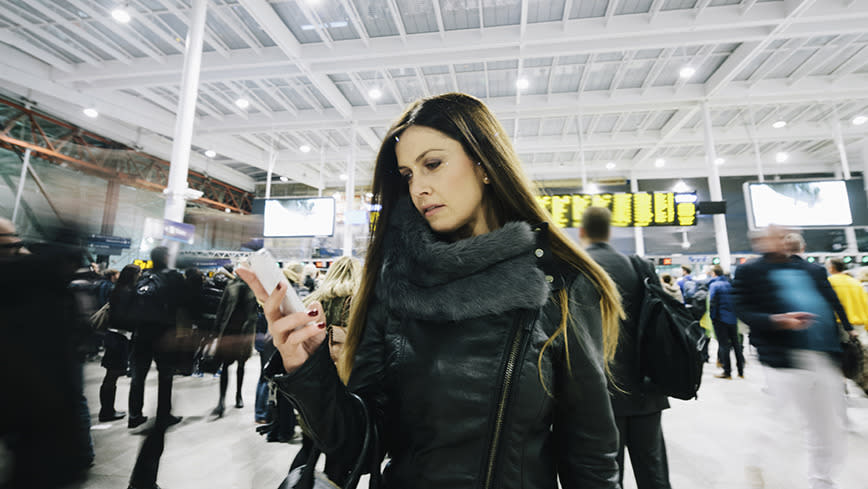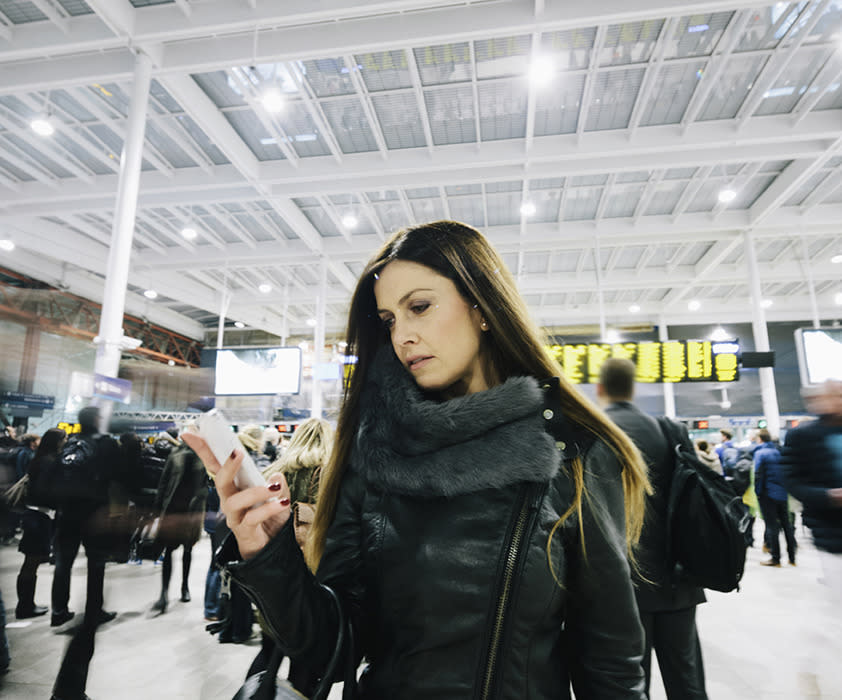Six ways to keep from getting kicked off your flight for a tweet
People used to put their phones in “airplane mode” in order to comply with FAA rules about in-flight electronics. Now “airplane mode” can serve another aviation-related purpose: making sure you don’t tweet something that gets you kicked off your flight.
Computer security expert Chris Roberts became the latest person to make national news for tweeting his way into a missed flight after he was dropped from a United Airlines flight this past weekend. His attorneys suggest the airline was retaliating against him for a tweet he sent on another United flight last week, when he’d joked about hacking the plane’s communications systems.
According to CNET, the tweet apparently referred to hacking the plane’s communications systems to make the oxygen masks drop down (for the past several months, Roberts has been publicly warning that airline in-flight entertainment systems are vulnerable to terrorist cyber attacks). In that instance, the FBI was waiting for Roberts when his flight landed; Roberts says agents questioned him for a few hours and took his electronic gear.
In an email to Yahoo Travel, a United Airlines spokesperson took exception to reports that the airline booted Roberts for a tweet. “The characterisation ‘...for a tweet’ is not correct,” the spokesman wrote us. “Given Mr. Roberts’ claims that he has manipulated aircraft systems while inflight, a clear violation of United policy, we’ve decided it’s in the best interest of our customers and crew members that he not be allowed to fly United.”
RELATED: Angriest and funniest things tweeted to airport security
While United, as airlines often do in these cases, denied booting Roberts over a mere tweet, it’s safe to say that if there had been no tweet, Roberts would have made his flight. That was certainly the case in three other recent high-profile cases where a tweet got someone getting kicked off a plane:
- Last November, YouTube star Matthew Lush (a.k.a., “GayGod”) got banned from his flight after waging a Twitter campaign against an airline that wouldn’t give him a refund on his non-refundable ticket.
- In October, JetBlue passenger Lisa Carter-Knight was denied boarding for a Philadelphia to Boston flight after tweeting about a pilot’s sobriety test and posting pics of various employees.
- And last July, Duff Watson and his two kids were temporarily removed from a plane they’d just boarded because he’d complained on Twitter about a gate agent with whom he’d just had a confrontation. He was allowed back on after he deleted the tweet.
Like Roberts’, Lush, Carter-Knight, and Watson’s Twitter escapades made national headlines and received countless social media mentions. Watson says he wasn’t prepared for the instant infamy. “The amount of criticism I took for airing this customer service complaint is unbelievable,” Watson tells Yahoo Travel. He says he endured personal attacks on his character, his family, his politics, and even his weight and his complexion. “I took so much criticism from strangers,” he says, likening the social media backlash to a lynch mob.
Yes, tweeting an airline can be an effective way to have your customer service issues addressed. But if you don’t want your tweet to put you at risk for getting kicked off a plane, becoming national news, and/or your getting arrested, it’s best to follow these simple rules for tweeting complaints about an airline:
Don’t tweet about bad stuff happening to an airplane
You know how you’re not supposed to say the word “bomb” on an airplane? It’s also best not to tweet “bomb” or “hack” or about any other calamity befalling an airplane you’re boarding — especially if, like Roberts and his oxygen mask post, your tweet has you doing the (hypothetical) dirty deed.
Don’t tweet while mad... and/or still at the airport
Tweeting while mad rarely leads to good things. But a tweet sent in the heat of the moment at an airport could land you in hot water. If, say, you just had a fight with a gate agent and feel the need to alert the airline about their rude employee, consider waiting until after you land; not only will your feelings be less raw after you’ve cooled off, at that point there’s nothing the airline can do to you (unless, as in Roberts case, you have a flight booked on the airline days later). If, on the other hand, you’re angry at an airline for something they need to fix (lost luggage, for example) remove emotion from the equation and just stick to the facts. Speaking of which...
Consider not mentioning the airline’s name unless there’s something specific they can do for you at that moment
Something the recent “kicked off for a tweet” stories have in common is that they all expressed opinions, not customer service issues. Meaningless venting about a rude employe or messed-up boarding procedures may make for great Twitter. But all it takes is one oversensitive airline employee and you’ve missed your plane — all for a lone retweet and a couple of “favourites.” If there’s nothing gained by mentioning the airline, like having your luggage found or getting rebooked after missing a flight, why draw the airline’s attention, or its potential wrath, by mentioning it by name?
Be reasonable
In the case of Matthew Lush, who got banned from his flight after unleashing a Twitter campaign against an airline that wouldn’t refund his non-refundable ticket, even the even-handed folks here at Yahoo Travel had trouble sympathising; our headline read: “Passenger Banned... For Being a Brat.” Starting a, frankly, bratty Twitter war against an airline just because they made you follow a rule they impose on everyone else, can be counterproductive; in Lush’s case not only did the airline, JetBlue, ban him from his flight, they did so unapologetically, without issuing the standard “we overreacted” apology airlines sometimes put out after such stories.
Don’t ID airport employees by name or by their faces
People tend to be touchy about strangers splashing their names and images all over social media, especially in a negative context. Airline employees are no different. Watson’s claimed his tweet got him in trouble because he mentioned the offending gate agent by the first name. And after Carter-Knight got banned from a flight in Philadelphia, she told Yahoo Travel that a gate agent told her straight-up: “You shouldn’t have put my picture on Facebook and Twitter.”
Remember: Your tweets are forever
A few days after the controversial tweet that got him kicked off United, Chris Roberts acknowledged that was one tweet he’d probably like to have back.
@Shaun76 absolutely and yes I should have moderated my response to the situation in a less inflammatory manner.... Wish all parties had...
— Chris Roberts (@Sidragon1) April 20, 2015
It’s may seem cliché because it’s true: The second you hit “Tweet,” your 140 characters belong to the world. “Once it’s out there on social media, you don’t have any control,” says Watson. “You can’t pull it back.”
Lisa Carter-Knight has no regrets about her past Twitter troubles with an airline. “My experience with JetBlue has heightened my awareness of poor customer service,” she tells Yahoo Travel in an email. “I will continue to share my experiences in regards to customer service issues with the public whenever I can. I’m an active participant on Twitter and Facebook and often will comment on Yelp about service.”
But Watson’s experience with airlines and social media has left him a little gun shy. After the unwanted news attention — and the backlash — he got from the incident, Watson says he doesn’t know if he’ll ever again complain about an airline on Twitter. “I’ve become more reserved on Twitter,” he says. “I am more reluctant based on what happened.”
Yes, some people will balk at the notion of moderating their airline-related complaint tweets when flying. “It’s my social media account and I’ll say what I want!” they’ll protest. “It’s a free country!” Yes, it is... but not in an airport, where airline employees have tremendous power to impact your day and your trip. With most major airlines closely monitoring social media, being overly antagonistic (or threatening) on Twitter can put a serious damper on your travel plans. And in extreme cases when that tweet goes viral, that extra attention could boomerang against you, upending your personal or professional life.
Is it fair? Maybe not. But ask yourself: Would you rather be in the right on Twitter? Or would you rather just get home?
This article originally appeared on Yahoo Travel.

 Yahoo Lifestyle
Yahoo Lifestyle 

